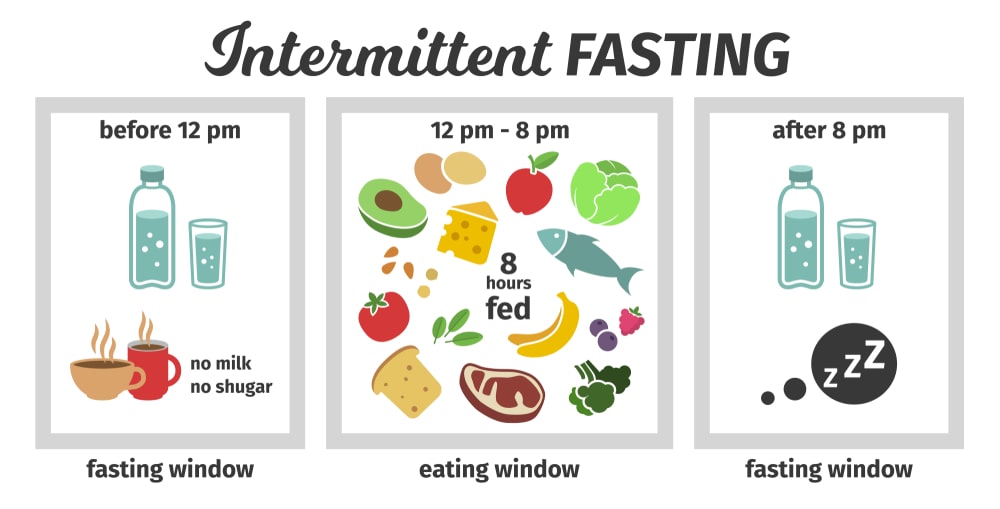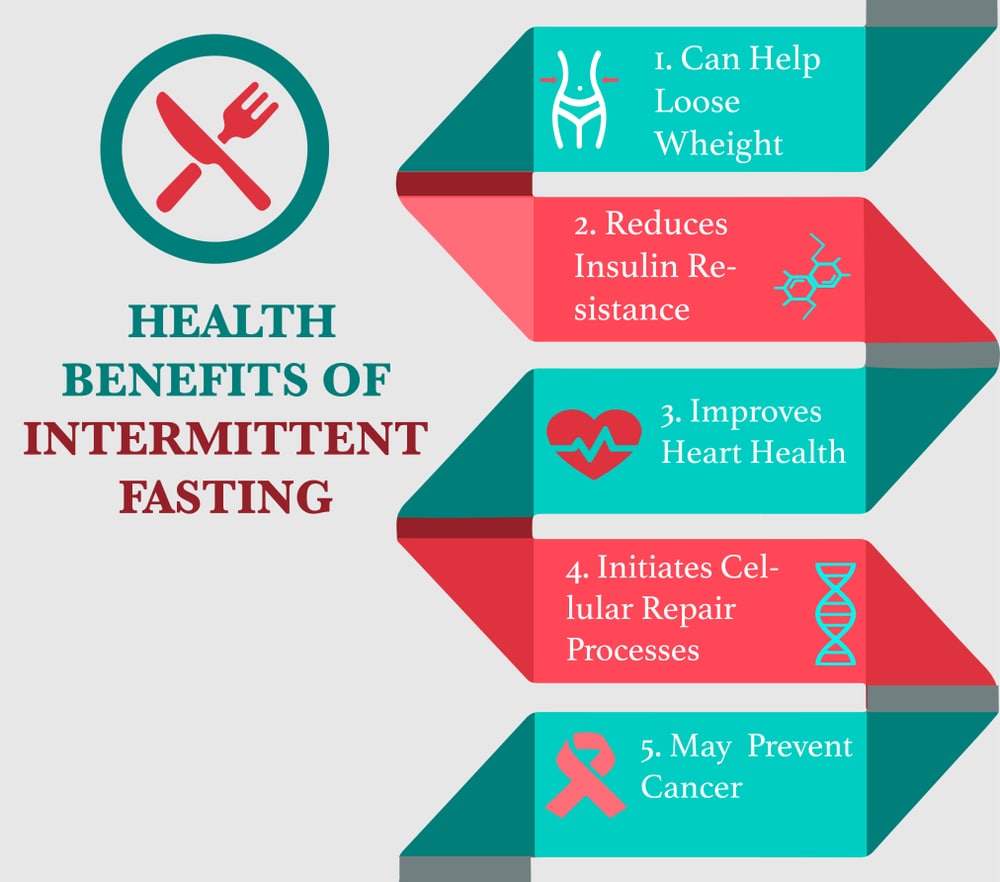Is Intermittent Fasting Healthy?
What is Intermittent fasting?

Intermittent fasting is an eating plan or dietary pattern in which one cycles between fasting and eating daily at a specific time. It is one of the kinds of fasting or dieting that emphasizes ‘when to eat’ instead of ‘what to eat’.
It is a seemingly easier and quite flexible fasting to incorporate into one’s routine in contrast to traditional fasting and strict calorie restriction. But before going ahead with intermittent fasting, it is important to get the approval of a healthcare expert too. This guide will also discuss “Is intermittent fasting healthy” for you?
Types of Intermittent fasting:

Most people who think about how to do intermittent fasting can do intermittent fasting in the following ways:
- Time-restricted eating (16/8 fasting): This kind of intermittent fasting involves eating and fasting on set periods and is practiced between 1 and 7 days every week. For instance, 16:8 fasting means the fasting window is 16 hours, and the eating period of 8 hours.
- Twice-a-week fasting (5:2 approach): In this kind of intermittent fasting, individuals restrict their calorie intake (usually to 500 calories) for two non-consecutive days every week and have a balanced diet for the other five days every week.
- Modified alternate-day fasting: This type of intermittent fasting includes reducing calorie intake often to 500 every alternate day of the week.
- 24-hour fasting (eat: stop: eat approach/ 14:10 method): This is a completely fasting state where individuals consume only water for 24 hours once or twice a week and have a balanced diet on other days.
Thinking is intermittent fasting healthy by any of the following approaches? Read our detailed guide for more details.
How does Intermittent fasting work?

Most experts say that during the fasting window, the body of an individual who is on intermittent fasting exhausts its sugar stores and starts metabolizing its extra fat for energy. They refer to this process as metabolic switching.
There are three scientific hypotheses/theories on how intermittent fasting works and also describe is intermittent fasting healthy:
- The Ketosis theory: It is a popular theory among scientists and even laymen. As per this theory, intermittent fasting leads to a shift of the body’s metabolism towards fat burning and increased insulin sensitivity. As a result, individuals lose their body fats which ultimately leads to their weight loss. This is a short-term benefit of intermittent fasting.
- The oxidative stress and circadian rhythm hypothesis: This hypothesis suggests that when there is intermittent fasting, the lower calorie intake can reduce oxidative stress and increase antioxidant activity, improving the 24-hour sleep-wake cycle (circadian rhythm). It can result in reduced cellular inflammation and more breakdown and disposal of dysfunctional cells, eventually reducing the risk of chronic diseases. This hypothesis describes the long-term positive impact of intermittent fasting.
- The improved gut health theory: Clinical trials on people who have been on intermittent fasting have shown improved composition of gut microbiota, an increase in levels of gut hormones that regulate appetite, and better health of the gut wall. The theory of better health of the gut partly describes the benefits of intermittent fasting on metabolic health and body composition.
What to eat during Intermittent fasting?

At times of fasting, having clear drinking water is advised and black coffee/tea is permitted. During eating periods, eating healthily is recommended instead of feeding on high-calorie junk foods, super fatty foods, and sugar-loaded treats.
Most nutritionists regard the Mediterranean diet as the best to follow when on eating window. This means having a balanced portion of green, leafy vegetables, healthy fats, lean proteins, and complex/unrefined carbohydrates such as whole grains.
What individuals eat during the eating window when on intermittent fasting can tell whether is intermittent fasting healthy for them.
Here are some food choices to eat during intermittent fasting:
- Lean Proteins: This includes chicken, turkey, fish, eggs, tofu, and legumes.
- Healthy Fats: This includes avocados, nuts, seeds, and olive oil.
- Fiber-rich Foods: This includes vegetables, fruits, and whole grains like quinoa, brown rice, and oats.
- Complex Carbohydrates: This includes sweet potatoes, beans, lentils, and whole grains.
- Hydration: This includes herbal teas and detox drinks.
- Minimize Processed Foods: Avoid processed foods, sugary snacks, and refined carbohydrates.
To delve into the benefits of intermittent fasting, proceed to the following section titled “Is intermittent fasting healthy?“
Is Intermittent Fasting Healthy?
Researchers believe that intermittent fasting can have a positive impact on an individual’s body and brain. They answer the most frequently asked question “Is intermittent fasting healthy” by revealing some of the research-backed benefits of intermittent fasting.
The benefits of intermittent fasting in humans include:

- Improved thinking power and verbal memory.
- Improved blood pressure and better resting heart rates as well as other measurements related to heart health.
- Better physical performance because of fat loss while maintaining healthy muscle mass.
- Reduction in visceral fat and loss in body weight.
- Reduced levels of fasting insulin and leptin hormone while decreasing insulin resistance, reduced fasting glucose, and increased levels of adiponectin in type 2 diabetes patients.
- Starting of cellular repair processes such as water removal from cells.
- Protection against diseases by causing beneficial changes in the expression of several genes.
- This is a simple-to-follow method and helps save time and effort spent on meal preparation.
- It supports brain health by enhancing brain function. It helps in reducing inflammation and also promotes the growth of new nerve cells.
- It improves heart health by reducing risk factors such as LDL cholesterol, blood triglycerides, and inflammation markers.
- Lower oxidative stress and inflammation in the body.
- It may prevent cancers and Alzheimer’s disease.
- Have the potential to extend life span.
Limitations and Risks of Intermittent Fasting:

Some potential side effects or risks of intermittent fasting that one must watch for, especially if a beginner are:
- Low blood sugar (Hypoglycemia).
- Weakness
- Dizziness
- Loss of muscle mass.
Intermittent fasting plan must be followed with caution or avoided if:
- Are aged under 25 years or elderly.
- Having hormonal imbalances.
- Suffering from a seizure disorder.
- Are pregnant or breastfeeding.
- Working during the night.
- Having dementia.
- Having disordered eating.
- Taking insulin or any other diabetes medication to control your blood sugar levels.
- Operating on heavy machinery.
- Having a compromised immune system or using immunosuppressive drugs.
Is intermittent fasting healthy or unsafe for you? Feel free to discuss it with your healthcare provider for more details.
FAQs:
Does intermittent fasting work for women?
Intermittent fasting is beneficial for women just like men or people assigned male at birth in many ways. Women who intermittently fast can lose weight by reducing their appetite, getting rid of inflammation in any area of the body, improving their gut health, improving their immunity, and improving their blood pressure. It’s essential to consult your healthcare provider for personalized guidance for more details – Is intermittent fasting healthy for you?
Can you drink coffee while intermittent fasting?
All regular coffee variations and add-ins have fat and calories while black coffee is fat-free and has almost no calories. This means consuming black coffee may not break your intermittent fasting as possible with other coffee variations. However, as coffee contains caffeine which can temporarily speed up metabolism, you can potentially be out of your starvation mode by having coffee and so must avoid it.
Can you drink water while intermittent fasting?
Fasting of any kind does not mean reducing water intake. It is necessary to always keep your body well-hydrated, even during intermittent fasting, by drinking adequate water daily. If your water intake is not enough during intermittent fasting, your body may confuse your thirst with hunger and you might end up feeding yourself more and gain weight instead of losing it.
How long does intermittent fasting take to work?
The effects of intermittent fasting vary for every individual who is intermittently fasting and majorly depend upon the unique health goals of the individual. If one is hoping to lose weight, reduce inflammation, and improve metabolic health, intermittent fasting needs to be practiced for a month or longer. Long-term intermittent fasting is required in case one wants sustained benefits of intermittent fasting like good overall health and disease prevention.
Is intermittent fasting good for diabetics?
Many diabetics question their healthcare providers “Is intermittent fasting healthy for them”. The answer to this is still under research. Some studies have found that full-blown intermittent fasting by diabetics can potentially harm their blood sugar control and lead to hypoglycemia- reduced blood sugar. Keeping in mind the risks of fluctuations in blood sugar levels in diabetics people by intermittent fasting, diabetics are advised to try other strategies to lose weight instead of fasting.
References:
- https://www.hopkinsmedicine.org/health/wellness-and-prevention/intermittent-fasting-what-is-it-and-how-does-it-work
- https://www.mayoclinic.org/healthy-lifestyle/nutrition-and-healthy-eating/expert-answers/intermittent-fasting/faq-20441303
- https://www.healthline.com/nutrition/10-health-benefits-of-intermittent-fasting

